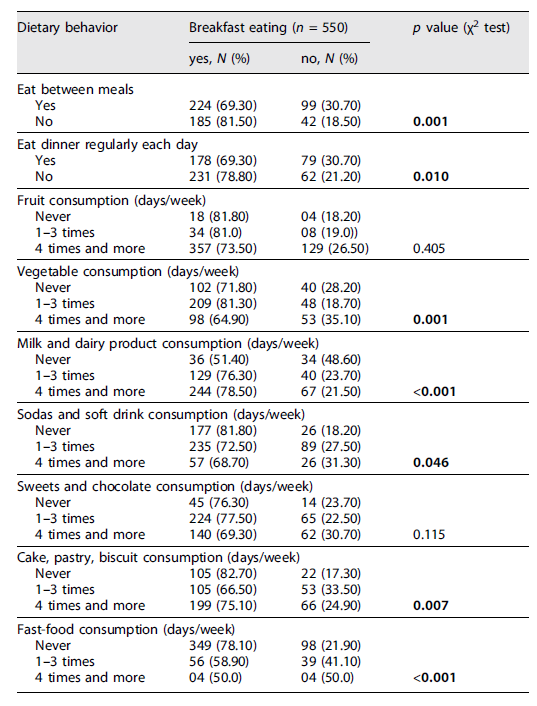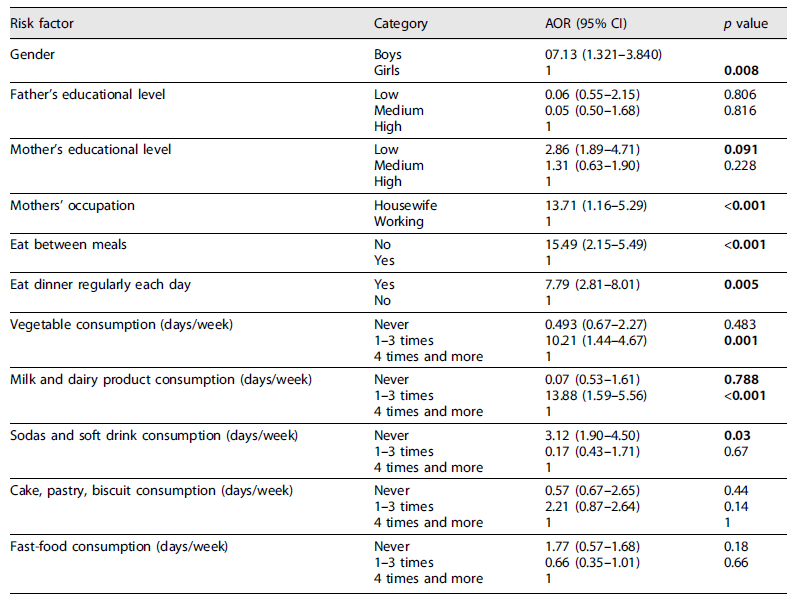Introduction
The provision of energy and nutrients throughout the day is extremely important and breakfast has been considered an important dietary factor for energy regulation 1. Moreover, in the 1980s, some studies reported that breakfast could play an important role in the prevention of adult chronic diseases such as heart disease, cancer, diabetes, and osteoporosis 2. Missing breakfast on the other hand has been associated with adverse effects on cognitive function (including memory), academic performance, school attendance, psychosocial function, and mood in children and young people 3. Furthermore, reduced breakfast energy intake is associated with a higher total daily energy intake 4, and when breakfast is skipped, it can be difficult to properly compensate for it later in the day. For example, those people who skipped breakfast are reported to have higher daily intakes of fat, cholesterol, and energy, and lower intakes of fiber, vitamins, and minerals in comparison to breakfast eaters, thereby increasing the likelihood of gastrointestinal disease later in life 5.
Evidence suggests that breakfast skipping is most prevalent among females, older children, and adolescents 6. Commonly reported reasons for breakfast skipping among children and adolescents include those related to a lack of time, enjoyment of breakfast, feelings of hunger in the morning, and weight control 7. Further, as with much health-related behavior, breakfast skipping is socioeconomically patterned and tends to cluster with other unhealthy behaviors such as poor diet, exercise, and sleep habits 8.
Nowadays, in Morocco, the focused agenda is undernutrition, but there is evidence for nutrition transition, particularly in urban areas which might contribute to overnutrition. In Morocco, particularly in the study area, there was no information regarding the prevalence and contributing factors of breakfast skipping among schoolchildren. Hence, the current survey was conducted among schoolchildren in the Beni Mellal city with the aim of documenting the prevalence of skipping breakfast. A longer term goal was to use the survey results to assist with the design of interventions to change breakfast consumption habits to ensure enough energy and nutrient intake in the morning among school-aged children.
Methods
Study Participants and Data Collection
As part of a research program on the health and hygiene of the schoolchildren population of the Beni Mellal-Khenifra region, we conducted, in 2017, a retrospective cross-sectional survey in some public schools in the Beni Mellal city, and a sample of 550 schoolchildren aged 12-19 years old was established.
Ethics Statement
Written approval was obtained from the Regional Academy for Education in Beni Mellal before the initiation of the study on April 4, 2016 (reference no. 38/16). Permission to approach schools in the study area was also obtained from the school authorities involved. The participation was voluntary and anonymous. Participants were informed about the study objective. All data were confidential and protected at all stages of the study.
Sample Size and Sampling Procedures
A cross-sectional school-based study was conducted among 550 healthy children aged between 12 and 19 years old from urban public schools in Beni Mellal city in the year 2017. The sample size was calculated using a single proportion formula by considering the following assumptions: the prevalence of breakfast skipping among schoolchildren (12-19 years) was unknown and taken as 50%, margin of error of 5%, confidence level of 95%, 10% nonresponse rate, and a design effect of 1.5. The final sample size was 550.
A multi-stage sampling technique was carried out. Primary sampling units were selected from schools (middle and high schools). By taking 20% of both middle and high schools, which are two middle and two high schools, were included in the study. The lottery method was used to select schools; for each selected school, the samples were allocated proportionally to the number of students with respect to grade level. The secondary sampling unit was randomly selected students from each selected grade and section. Proportional allocation of the sample to the total number of students was made and 315 students from colleges and 235 students from high schools with a total of 550 students were included in the study using a systematic random sampling technique.
Data Quality Control
For data quality control, a pretest on 5% of the samples was performed and regular supervision during data collection was also carried out. The completeness of the questionnaire was checked before data entry too.
Questionnaire and Measures
The questionnaire used in this study was adapted from that of previous studies conducted in Morocco 9-11. Its validity was examined in a pilot of 25 schoolchildren, which showed that it was acceptable and understandable. The questionnaire contains information on demographic and socioeconomic variables, eating habits, physical activity, and sedentary time.
We defined breakfast per the Student Nutrition Dietary Assessment, which is any food or beverage consumption between awakening and 45 min after the start of school 12,13. Subjects who did not consume breakfast on one of 2 days or neither day were categorized as breakfast skippers, while those who consumed breakfast on both days were classified as breakfast eaters 14.
Parents’ education level was categorized into three groups. Parents who had never attended school or only koranic or primary school were considered to have a low educational level; a medium level of education corresponded to secondary education (junior to senior high school), and a high educational level corresponded to higher education and university. The monthly income of the family was used as a class variable in the following categories: low socioeconomic level, income <3,000 Moroccan dirhams (MAD; 1 MAD = 0.09 Euro) per month; medium level, income of 3,000-8,000 MAD per month; and high socioeconomic level, a salary above 8000 MAD per month.
Height and body weight were measured for all participants by trained research staff; body weight was measured to the nearest 0.1 kg using a digital scale (Seca 877, Seca, Hamburg, Germany) and height was recorded to the nearest 0.1 cm using a wall-mounted stadiometer (Seca 216). Measurements were taken for each participant with light clothing and without shoes, and body mass index (BMI) was calculated as weight in kilograms divided by height in meters squared. Children’s corpulence was classified according to the WHO reference curves (2007) for children aged 5-19 years 15.
Statistical Analysis
The prevalence of skipping breakfast was determined from one survey item and in relation to demographic characteristics and some lifestyle habits. Multiple logistic regression analysis was used to ascertain factors associated with breakfast eating. In multiple logistic regression analysis, eating breakfast daily was considered the dependent variable, and the following as independent variables: demographic characteristics and dietary behaviors.
Quantitative data were inputted using EpiData (Version 3.1). Statistical analysis was carried out using Statistical Package for Social Sciences, version 19.0 (SPSS, Chicago, IL, USA) software. Data are presented as the mean ± standard deviation for continuous variables and proportions for categorical variables. The χ2 test was used to assess statistical significance between the dependent variable (breakfast skipping) and potential explanatory variables. All significant variables in the χ2 test analysis (p < 0.05) were considered in the multivariate logistic regression model to determine independent factors associated with breakfast skipping.
Results
We included 550 school-aged children (295 girls and 255 boys) with mean ages of 14.91 ± 1.86 years for boys and 14.59 ± 1.65 years for girls. Table 1 shows the anthropometric characteristics and the breakfast eating habits. No significant differences were found between boys and girls in age and weight. The prevalence of skipping breakfast consumption was 25.6%. Skipping breakfast consumption prevalence among girls was significantly higher compared to boys (29.8% vs. 20.8%) (Table 1).
Table 1 Anthropometrics and breakfast eating of the study sample
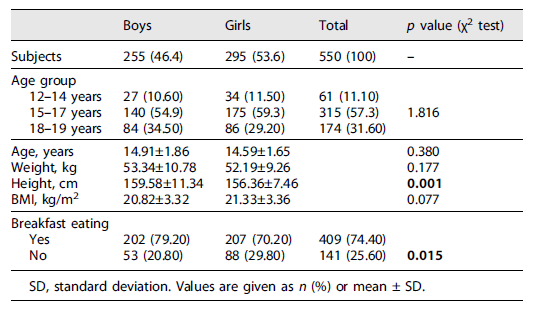
SD, standard deviation. Values are given as n (%) or mean ± SD.
The prevalence of skipping breakfast consumption in relation to demographic characteristics is shown in Table 2. We found a statistically significant association between the parent’s educational level and the habit of breakfast eating by adolescents (p < 0.001); the high prevalence of breakfast skipping was more prevalent among adolescents of parents with a higher level of education and working mothers (p < 0.001). No significant association was found between the age of schoolchildren, family income, and breakfast skipping habits in adolescents.
Table 2 Breakfast consumption prevalence among schoolchildren according to demographic characteristics
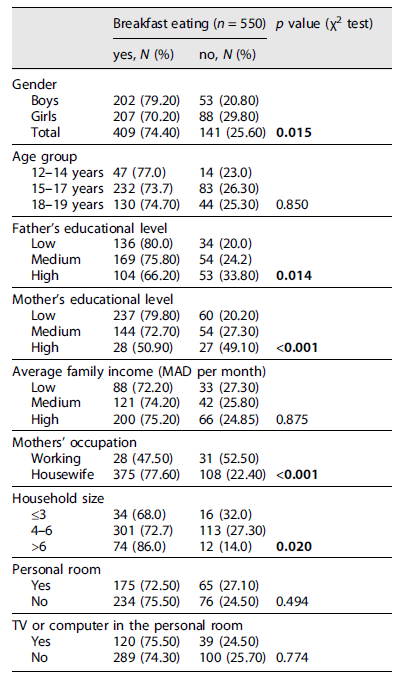
Eating habits of breakfast eater adolescents as depicted in Table 3 show a statistically significant relationship between the eating breakfast habit and eating between meals (p = 0.001); eating dinner regularly each day (p = 0.01); the frequency of consumption of milk and dairy products (p < 0.001); the vegetable consumption (p = 0.001); the consumption of sodas and soft drinks (p = 0.046); the consumption of cake, pastry, and biscuit (p < 0.001); and the consumption of fast food (p = 0.004).
In the multivariate logistic regression analysis (Table 4), eating breakfast was significantly associated with gender (odds ratio OR = 7.13 95% CI 1.32-3.84, p = 0.008); mother’s low educational level (OR = 2.8 95% CI 1.89-4.71, p = 0.091); housewife mothers (OR = 13.71 95% CI 1.16-5.29, p < 0.001); not eating between meals (OR = 15.49 95% CI 2.15-5.49, p < 0.001); eating dinner regularly each day (OR = 17.79 95% CI 2.81-8.01, p = 0.005); eating vegetables 1-3 times per week (OR = 10.21 95% CI 1.44-4.67, p = 0.001); taking milk and dairy product 1-3 times per week (OR = 13.88 95% CI 1.59-5.56, p < 0.001); and never taking sodas and soft drink in week (OR = 3.12 95% CI 1.90-4.50, p = 0.003).
Discussion
The aim of this study was to describe the demographic and dietary patterns associated with breakfast skipping among Moroccan school adolescents (12-19 years). The findings of this study revealed that the prevalence of breakfast consumption was 74.6%, meaning that the prevalence of missing breakfast was nearly 26%. These findings are consistent with other studies carried out worldwide among schoolchildren 16,17. However, the prevalence of breakfast consumption in the current study is slightly higher than in other studies conducted among schoolchildren and adolescents of the same age 18-20. Developed countries, in general, have a prevalence of skipping breakfast among children ranging from 10 to 30% 21-23. Varied operational definitions and measures of breakfast consumption, and the different age groups studied by researchers, using a variety of study designs, may explain these differences. In the USA, for example, the trend of breakfast consumption declined (from 1965 to 1991) among older adolescents, attributed to their behavioral changes 24.
Our study indicated that missing breakfast is more common in girls. The same pattern was found in studies conducted in France, Norway, and the USA 25‒27. In contrast, other studies showed no differences between boys and girls 28-30. This variation and inconsistencies between boys and girls may be explained by different cultures, age groups, races, and the variety of study designs 28‒31.
In our study, breakfast skipping was more prevalent among children of working and with a high level of education mothers. This was not in line with findings among children and adolescents in the USA 27 and the adult Dutch population 32. In contrast, no relationship was found between breakfast eating and income level in Canadian children 33,34.
Another factor found to be significantly associated with breakfast skipping was unhealthy dietary habits including eating between meals, lunch and dinner skipping, and consuming sodas and soft drinks one time or more per week. These findings are consistent with reports in many parts of the world where the “normal” diet is becoming increasingly energy-dense and sweeter, with high-fiber foods being replaced by more highly processed versions 35. The adoption of such poor dietary practices increases the risk of adolescents developing noncommunicable diseases, as unhealthy eating is considered one of the main causes 36. A lot of research points out the relationship between the consumption of sugar-sweetened beverages and positive energy balance leading to the development of obesity. Almost 17,000 children aged 9-14 were asked to note all the beverages consumed during a period of 1 year. There was a linear relationship between the consumption of sugar-added beverages and weight gain, both in boys and girls. For instance, in a group of boys who drank one tin of sugar-sweetened beverage per day, the BMI raised during 1 year by 3%, while in the group of boys not drinking such beverages, their BMI remained stable 37 (Fig. 1).
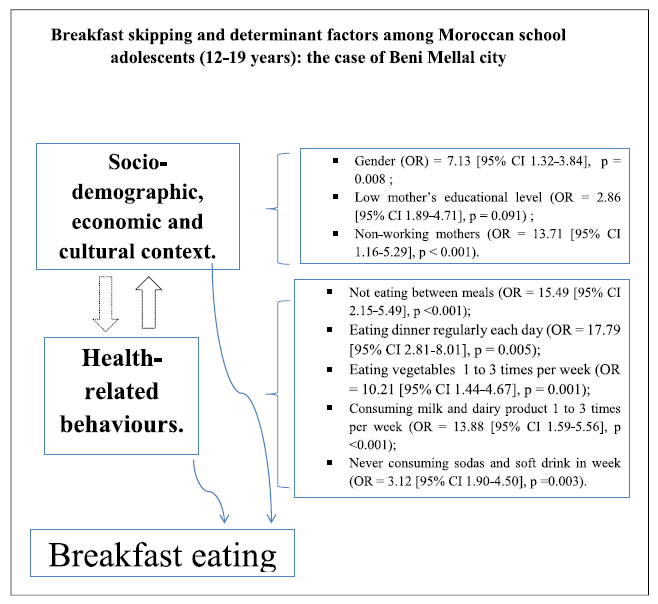
Fig. 1 Framework model for breakfast eating and determinant factors among Moroccan school adolescents (12-19 years): the case of Beni Mellal city.
Limitations
First, the study is not free from the pitfalls of the cross-sectional study design. Consequently, the result of the study did not show the temporal cause-and-effect relationship between the outcome and the independent variables. Recall bias may be the second limitation of the study, mainly in measuring the child’s dietary habits.
Conclusion
The current survey has revealed that 25.6% of school-aged children reported not consuming breakfast every day. In addition, our study indicated that missing breakfast is more common in girls, and breakfast skipping was more prevalent in children of working and having a high level of education mothers. Another factor found to be significantly associated with breakfast skipping was unhealthy dietary habits including eating between meals, lunch and dinner skipping, and consuming sodas and soft drinks one time or more per week. Health education programs are therefore needed to encourage breakfast eating, targeted at special groups at risk. These programs should consider the different reasons for skipping breakfast.
Statement of Ethics
Written informed consent was obtained from parents of children prior to the study. This consent procedure was reviewed and approved by the Institutional Ethical Committee of the faculty of sciences and techniques, Sultan Moulay Slimane University, Beni Mellal, with the approval number of FST/LGB/2016/14-OCT./006-JAN.2017-SEPT.2017 and the authorizations of the Regional Academy for Education in Beni Mellal on April 4, 2016 (reference no. 38/16).
Funding Sources
This research did not receive any specific grant from funding agencies in the public, commercial, or not-for-profit sectors.













